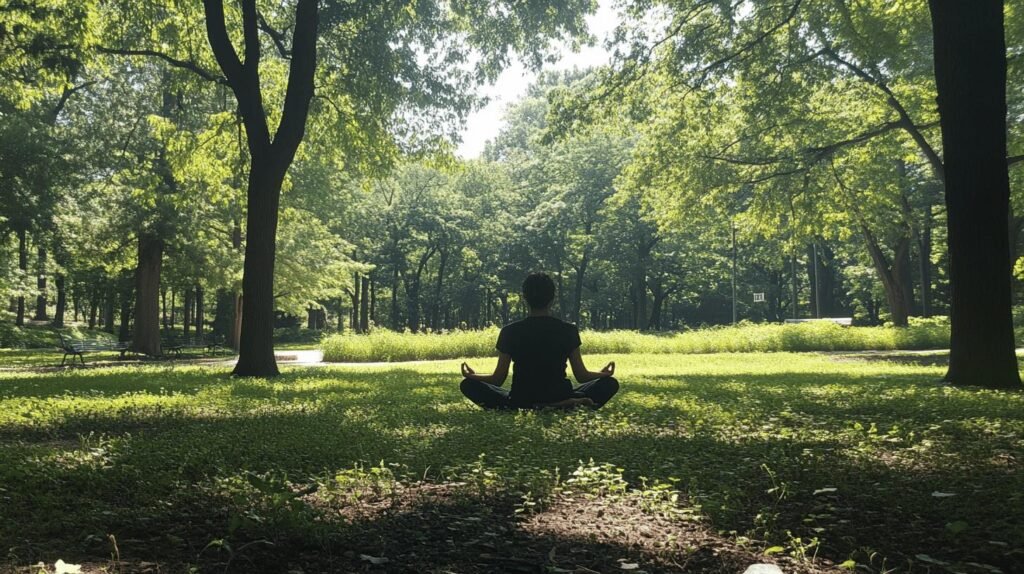TL;DR:
- Chronic stress increases risks for heart disease, anxiety, depression, digestive issues, sleep problems, and weak immune systems.
- Stress management is essential for mental and physical health.
- Effective strategies include:
- Mindfulness: Enhances mood and focuses on the present.
- Physical Exercise: Releases endorphins and reduces stress.
- Healthy Eating: A balanced diet supports calmness.
- Yoga and Meditation: Promotes relaxation and clarity.
- Daily tips: Journaling, setting boundaries, engaging in creative activities, taking breaks, using deep breathing, and practising positive self-talk.
- Direct Primary Care offers personalized stress management plans and direct doctor access.
- Hobbies like journaling, painting, music, and gardening help relieve stress and promote joy.
Ever feel like stress is the unwanted guest that won’t leave? Healthy Stress Management can help you show it the door before it wreaks havoc on your well-being. Here’s a shocker—if left unchecked, stress isn’t just annoying; it’s hazardous to your health! It can spark all sorts of physical and mental woes. That’s where healthy stress management swoops in like a superhero cape. We’re diving into how handling stress can boost your well-being naturally, keeping you happier and healthier in the long run. Ready to kick stress to the curb? Let’s chat more!
Understanding the Importance of Healthy Stress Management
Stress can feel like an uninvited guest. It activates your sympathetic nervous system, releasing adrenaline. This is useful for urgent situations, like a run-in with a bear (or meeting a deadline). Over time, persistent stress impacts both your mind and body.
- Heart Disease: Chronic stress raises heart disease risk.
- Anxiety and Depression: Long-term stress often leads to these mental health issues.
- Digestive Issues: Stress can cause issues like IBS.
- Sleep Problems: It often leads to sleep disturbances.
- Weak Immune System: Stress makes you more susceptible to illness.
Stress management is key because stress can steal your good health. Keeping stress in check is like setting up a health security system. You’ll protect both your mind and body, keeping health issues at bay. It’s about living your healthiest, happiest life.
Effective Stress Reduction Strategies for a Healthy Lifestyle

Stress is the kind of guest that appears uninvited. It is crucial to make stress management part of your daily routine. Here are some strategies to reduce stress and bring more peace into your life.
Mindfulness for Stress Reduction
When your mind races, mindfulness can help; it involves focusing on the present and easing stress-inducing thoughts. This practice can enhance mood and promote calmness.
Physical Exercise
Exercise isn’t just about fitness; it releases feel-good endorphins. These chemicals help reduce stress. Even a short walk or dance can lift your spirits and ease tension.
Healthy Eating Habits
Diet affects stress levels. A balanced diet with fruits, veggies, and whole grains supports a calm mind. It’s like fueling up for a stress-free journey.
Yoga and Meditation
Yoga and meditation are potent stress busters. Yoga combines relaxation and breathing exercises, while meditation clears mental clutter. Together, they promote peace and help you handle stress.
| Strategy | Benefits |
|————————–|—————————————–|
| Mindfulness | Focus on the present, reducing stress |
| Physical Exercise | Releases endorphins, alleviating stress |
| Healthy Eating Habits | Supports calm with a balanced diet |
| Yoga and Meditation | Provides relaxation and clarity |
Practical Stress Management Tips for Everyday Life
Daily habits play a major role in managing stress. Consistent small actions can build resilience to life’s challenges. Integrating stress management into your routine will create a buffer against stress that is adaptable to fit your lifestyle.
- Journaling: Write down thoughts to process emotions.
- Setting Boundaries: Say no to avoid overcommitment and burnout.
- Creative Activities: Engage in art, music, or crafts to relax.
- Regular Time-Outs: Take breaks to recharge.
- Quick Stress Relief: Use deep breathing or stretching to calm instantly.
- Positive Self-Talk: Replace negative thoughts with encouraging affirmations.
These stress management tips equip you with all you need to fight stress. Adjust them to fit your needs and lifestyle. By integrating stress management, you’ll reduce stress and boost your well-being.
The Role of Direct Primary Care in Stress Management

Traditional healthcare can feel complicated. Direct Primary Care (DPC) provides a simpler, more personalized approach. With DPC, you receive unique stress management plans. You can directly access your doctor to discuss stress sources and create stress-relief strategies together. It’s cost-effective, so there’s no need to worry about surprise bills.
DPC offers a holistic approach, addressing both physical and mental stressors. You can combine stress management techniques like mindfulness with health check-ins. Your doctor can even help you incorporate relaxation practices. It’s like having a wellness coach who knows your needs. This holistic method means you’re not just treating symptoms but nurturing your overall health.
Mindfulness and Relaxation Techniques for Stress Relief
Mindfulness and relaxation are like a spa day for your mind. They calm your nervous system, creating a peaceful state and enhancing stress resilience. Here are some techniques to turn a stress frown upside down.
Meditation Practices
Meditation is a mental break that helps you pause from the hustle. Focusing on breath or a mantra trains your mind to release distractions and stress. It’s a mental workout for staying calm under pressure.
Deep Breathing Exercises
Feeling overwhelmed? Take a deep breath. Controlled breathing calms immediate stress. Try inhaling for four counts, holding, then exhaling for four. This signals your body to relax.
Progressive Muscle Relaxation
Progressive Muscle Relaxation (PMR) involves tensing and releasing muscles. This helps you notice and release physical tension. It’s like giving muscles a break from stress.
- Meditation: Enhances focus and reduces stress.
- Deep Breathing: Relaxes the nervous system.
- Progressive Muscle Relaxation: Relieves tension and promotes relaxation.
- Mindfulness: Encourages present awareness, reducing anxiety.
- Regular Practice: Builds long-term resilience.
Creative Activities and Hobbies for Stress Reduction

Engaging in hobbies can feel rejuvenating. Creative activities offer an escape from stress. They help express emotions and bring achievement, easing tension and uplifting mood. It’s like a vacation for your brain to recharge and strengthen.
- Journaling: Writing helps process emotions and clears the mind.
- Painting or Drawing: Art allows self-expression and soothes the soul.
- Playing Music: Music unlocks creativity and joy.
- Gardening: Nurturing plants calms the mind.
Incorporating hobbies into your routine is easy. Set aside time each week. Consistency is key, whether it’s an hour or a few minutes a day. Choose activities that resonate with you for joy and stress relief. By making them a regular part of life, you manage stress and enrich your days with peace and happiness.
Final Words
Navigating the world of stress management doesn’t have to be complicated. We dove into understanding healthy stress management and its crucial role in preventing health issues. There’s something for everyone, from mindfulness and exercise to direct primary care solutions.
Incorporating these strategies and tips into daily life can elevate your well-being. Remember, it’s about small, consistent efforts that make a significant difference.
So why not start today? Embrace healthy stress management and enjoy a more balanced, joyful life!
FAQ
What are five stress management techniques?
A: Five effective stress management techniques include practicing mindfulness, exercising regularly, maintaining a healthy diet, utilizing deep breathing exercises, and fostering supportive relationships.
How can one relieve stress quickly?
A: To relieve stress quickly, try deep breathing exercises, take a short walk, listen to music, stretch, or practice mindfulness. These methods can provide immediate relief and reset your mood.
What are the 4 A’s of stress management?
A: The 4 A’s of stress management are Avoid, Alter, Adapt, and Accept. They help in controlling stress by changing your response or perspective on stressful situations.
What are the 5 R’s of stress management?
A: The 5 R’s include Recognize, Respond, Recharge, Reevaluate, and Retain. Each step focuses on addressing stress and maintaining a balanced lifestyle.
What is a healthy stress management technique?
A: A healthy stress management technique involves regular exercise. It releases endorphins that improve mood and help manage stress effectively.
How important is stress management for overall health?
A: Effective stress management is crucial for physical and mental health. It helps prevent chronic conditions like heart disease, depression, and anxiety and promotes a balanced and healthy life.
What are some stress relief activities for students?
A: Stress relief activities for students include mindfulness meditation, regular exercise, structured time management, artistic hobbies, and socializing with friends to balance academic pressures.
How to manage stress better?
A: To manage stress better, focus on mindfulness, exercise, healthy eating, adequate sleep, and hobbies. These strategies help build resilience and improve emotional health.

